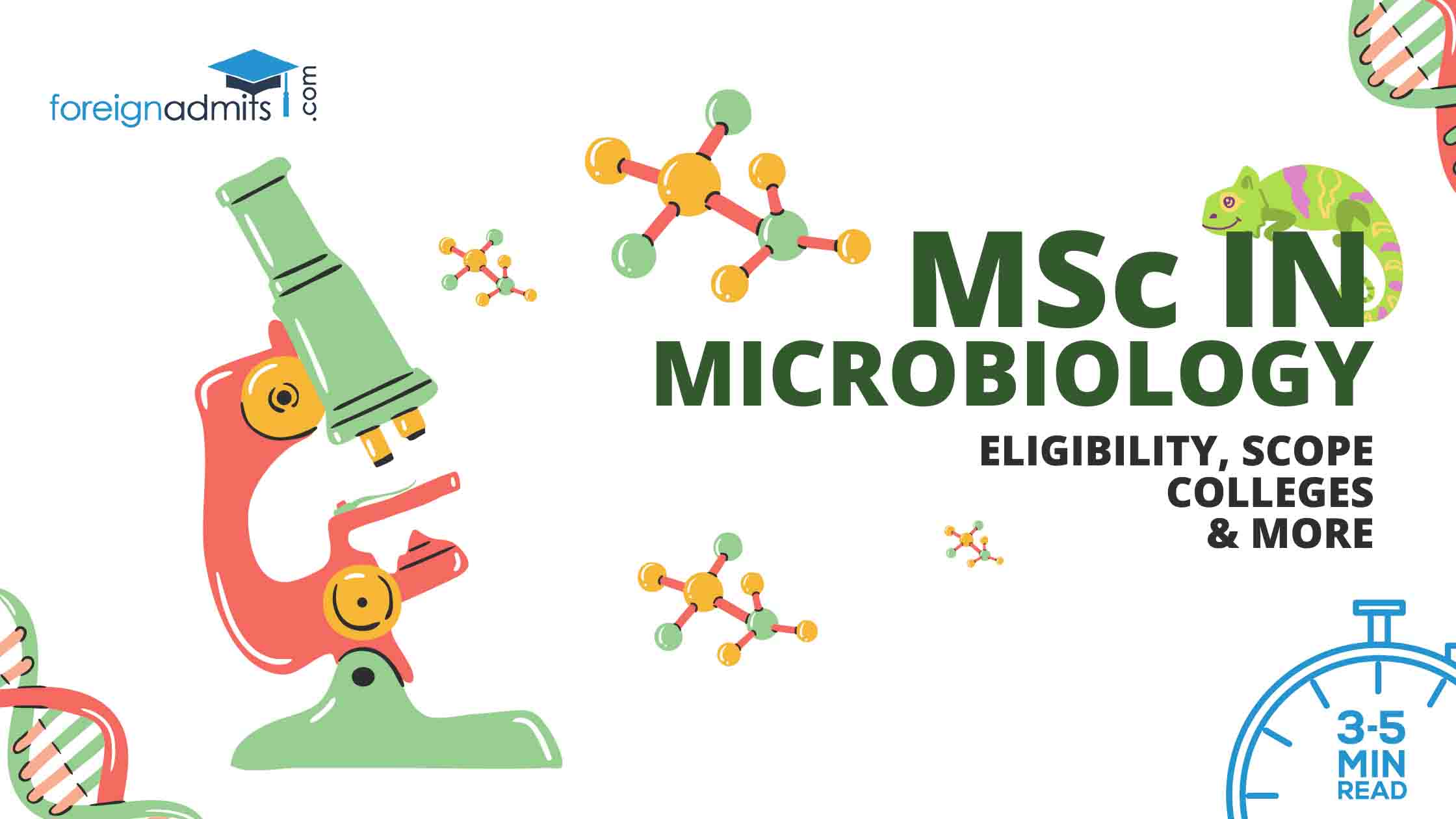The study of organisms so small that they cannot be viewed by the naked eye is microbiology. Microbiology combines chemistry and biology to study microbes such as bacteria, viruses, parasites, etc. further, the study of microbes is essential due to their role in digestion, biodegradation, nutrient cycling, climate change, biotechnology, medicine, etc. Microbiology is a vast subject, and it deals with biotechnology, genetics, virology, pathology, etc. in later years of study. Thus, MSc in Microbiology is a 2-year full-time course in India with specialisation. Additionally, this course deals with detailed microbiology topics like immunology, food, and dairy microbiology, enzymology, bioenergetics, etc. after studying this course you can become a microbiologist, researcher, analyst, nutritionist, etc.
[widgets_on_pages id=”Masters”]
For detailed blogs on science courses, their scopes, salaries, fees, and top colleges, read our blogs at ForeignAdmits. We not only spread awareness about various courses, scholarships, etc., but we also provide assistance to students in admission, availing scholarships, and studying abroad through counseling and personal call. Feel free to contact us at 8080679810.
Also read: Everything you need to know about BSc in Agriculture.
What is taught in MSc Microbiology?
The MSc in Microbiology course is divided into 4 semesters. Each semester has different papers on the topics mentioned below. Also, this course includes a lot of lab work and research work. At the end of the course, the student should also perform an independent project that becomes a basis for doctorate selection. Also, the course syllabus varies from college to college, but in general, the topics covered are here.

Semester I
- Food and dairy microbiology
- Bioinstrumentation
- Biostatistics
- Computer application
- Bioenergetics and molecular enzymology
Semester II
- Microbial diversities and extremophiles
- Microbial physiology
- Molecular immunology
- Recent trends in virology
Also Read: Pursuing a degree or doing a job- which is better?
Semester III
- Environmental microbial technology
- Microbial genetics
- Bioprocess engineering and technology
- Enzyme technology
Semester IV
- Pharmaceutical microbiology
- Bioinformatics, microbial genomics, and proteomics
- Fermentation technology
- Recombinant DNA technology
These are the papers in each semester whereas the topics covered in each paper and semesters are:
MSc in Microbiology Semester I
- Introduction to microbes and prokaryotes
- Distribution, morphology, and classification
- Nutrition and cultivation
- Morphological characteristics of bacteria
- Different cell morphology, flagella, pili, capsule, cell wall, cell membrane, cytoplasm, etc
MSc in Microbiology Semester II
- Structure and properties of mono, oligo, and polysaccharides
- Classification, structure, and properties of amino acids
- General aspects of amino acid metabolism
- Isolation techniques of microorganisms
- Classification, the structure of saturated and unsaturated fatty acids
- Fermentation reactions fermentation balances, homo, and heterolactic fermentation
MSc in Microbiology Semester III
- Soil microbiology
- Aquatic microbiology
- Plasmids and bacteriophage
- Eukaryotic genome
- Isolation techniques of microorganisms
MSc in Microbiology Semester IV
- Immune system and immunity
- Pharmaceutical microbiology
- Bioinformatics, microbial genomics, and proteomics
Here are the topics of the elective courses that the MSc Microbiology can opt for.
- Clinical microbiology
- Dairy microbiology
- Principles of food preservation
- Soil microbiology
- Microbiology of air
- Agricultural microbiology
Also Read: Masters in Social Work
Eligibility
The following are the eligibility criteria for admission into MSc in microbiology.
- Above all, the candidate should hold a bachelor’s degree from a government recognised institute in the country.
- The bachelor’s degree should be only from science courses or more specifically from life sciences like BSc Chemistry, BSc Botany, BSc Zoology, BSc Microbiology, BSc Genetics, BSc Biotechnology, and BSc physiology.
- Additionally, the candidate should score above 55 per cent of bachelor’s degree. However, for admission to a top college, merit is also considered, thus the higher the score better are the opportunities.
Also, the candidate should write a state of university entrance examination for admission into MSc in Microbiology. Thus, the cut-off of these entrance exams is different for different colleges.
Top colleges in India for MSc in Microbiology
Further, here is the list of top institutes in India for an MSc in Microbiology.
- SRM Institute of Science and Technology, Chennai
- St. Xavier College, Mumbai
- Jamia Millia Islamia University, New Delhi
- Madras Christian College, Chennai
- Maharaja Sayajirao University of Baroda, Varanasi
- Oxford College of Science, Bangalore
- Vellore Institute of Technology, Vellore
- Barkatulla University, Bhopal
- Modern College of Arts and Science, Pune
- University of Hyderabad, Hyderabad
- Jawaharlal Institute of Postgraduate Medical Education and Research (JIPMER), Pondicherry, Chennai
- Karunya Institute of Technology and Sciences, Coimbatore
Here is the list of top universities abroad for MSc in Microbiology
- Colorado state university
- University of Cincinnati, Ohio
- Dalhousie University, Halifax, Canada
- University of Manitoba, Winnipeg, Canada
- The University of British Columbia, British Columbia, Canada
- University of Guelph, Guelph, Canada
- Illinois Institute of Technology, Chicago
- University of Saskatchewan, Saskatoon, Canada
- Oregon State University, Oregon
- Glasgow Caledonian University, UK
[widgets_on_pages id=”Masters”]
Scope and Prospects
First of all, the graduates of microbiology can pursue a doctorate and enter into the research field. Otherwise, you can opt for jobs, and the job titles you can take up are microbiologist, research officer, lecturer, demonstrator, quality control executive, microbiology lab technician, clinical executive, chief hygienist, researcher, assistant professor, etc. additionally, there are various opportunities in the R&D sector as well as industrial laboratories. You can choose for a job in both the private and public sectors. The government sector jobs are research associate, lab technician, assistant professor, lecturer, microbiologist, clinical research associate, etc.
The salary of a fresher is Rs.2 to 2.5 lakh per annum while for experienced candidates it can reach up to Rs.4 to 5 lakh per annum.
In conclusion, if you think you have the skills and ability to pursue MSc in Microbiology then you should definitely go for it. The course is highly experimental and lab-based, thus requires accuracy, precision, and patience in the laboratory. For more information contact us at ForeignAdmits.
